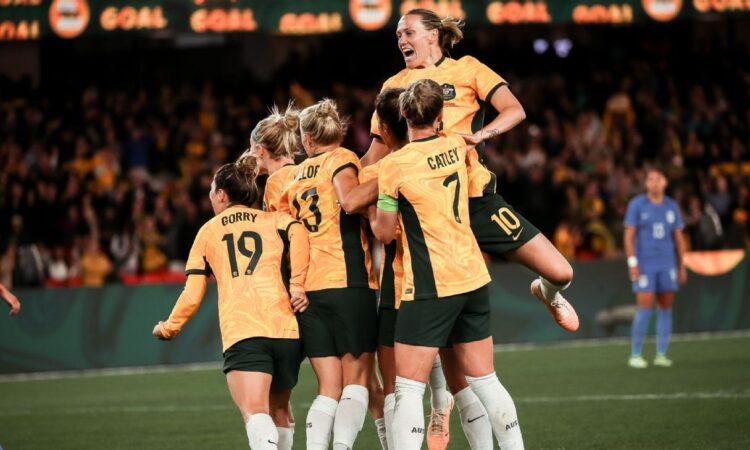
Marissa Lordanic4 Minute Read
Gustavsson’s philosophy vindicated by Matildas World Cup squad?
With a balanced, deep squad ready to welcome the World Cup to home shores, The Far Post podcast crew ask: has Tony Gustavsson’s process panned out?
The Matildas have called out FIFA’s unequal prize money in a video released ahead of the Women’s World Cup.
Just as the Socceroos did ahead of the men’s World Cup in 2022, the Matildas have made a statement, supported by their union, Professional Footballers Australia (PFA), on the issues that matter to them.
“The growth of women’s sport, and women’s football, has been phenomenal and the transformation of the Matildas’ environment has been emblematic of that development over a very short period of time,” PFA co-chief executive Kate Gill said.
– Women’s World Cup: Schedule | Rosters | News | Podcast
“But the players are acutely aware that much of that growth has been delivered through courageous actions by generations of previous players and that future progress will likely be driven by the players raising their voices again.
“There are many more improvements that can be achieved before women’s football can truly achieve parity with men’s football, and the current group of 23 players want to use their platform, and the platform of the World Cup, to accelerate further change, but importantly leave a legacy for future players.”
Each of the 23-member playing squad speaks in the video, detailing the history of this team’s fight for respect and equality on both the local and global front and calling for action.
“As Matildas, we are part of a special group of players. We stand on the shoulders of giants who paved the way to afford us the opportunities we have now,” Caitlin Foord said in the video.
“Those that came before us showed us that being a Matilda means something. They showed us how to fight for recognition, validation, and respect,” captain Sam Kerr added.
The Matildas have long fought for FIFA to equalise its prize money, including the ‘our goal is now’ campaign in 2019.
While the overall money distributed to member associations and players has increased from 2019 to 2023, a welcome but necessary move considering the tournament’s expansion from 24 teams to 32, it is still less than the money distributed across the men’s tournament for prize money, preparation funding, and club benefits.
“Collective bargaining has allowed us to ensure we now get the same conditions as the Socceroos, with one exception — FIFA will still only offer women one quarter as much prize money as men for the same achievement,” PFA executive member and Matildas utility Tameka Yallop explained.
The actual prize money for the Women’s World Cup is $110 million USD compared to $440 million USD for the men.
At his re-election earlier this year, FIFA President Gianni Infantino spoke of the governing body’s ambition to be able to equalise prize money in time for the next World Cups in 2026 and 2027.
He called this “the most difficult step, the most complicated step, the step that will take a longer time” in achieving equality between the tournaments.
FIFA reported total revenue of $7.6 billion USD for the four-year cycle from 2019 to 2022. This is an 18% increase from the previous four-year cycle. The organisation also has reserves of $4 billion USD.
There is currently nothing concrete to force FIFA to make that ambition a reality.
The Matildas also highlighted the lack of full-time opportunities for players in the A-League Women’s. While the upcoming season will feature a full home and away fixture for the first time in the competition’s history, many players still work outside of their footballing commitments to ensure they earn a livable wage. They called on fans to take their support from the World Cup and carry it to the ALW and the next generation of Matildas.
The Matildas also urged leaders across football, business, and politics to ensure opportunities for women and girls across all areas of football exist and that those is business and politics continue to work with football to further support the growth of the game.
The team also espoused the value of collective bargaining, something which isn’t afforded to many of the 736 players who will represent their country at this World Cup.






